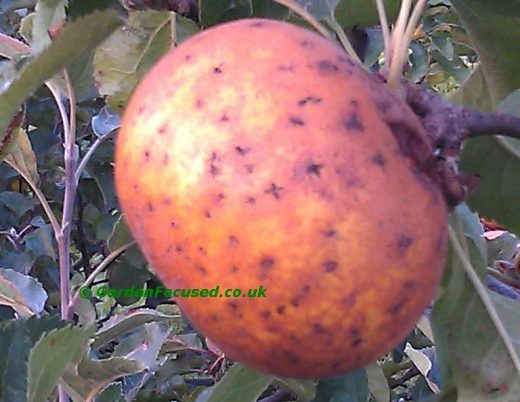IDENTIFYING BITTER PIT DAMAGE
Identifying the damage done by bitter pit is easy as the picture shows. The skin of the apple has small sunken brown marks on the skin. In may cases if the apple is cut in half the flesh also has brown marks on it. The apple will taste bitter. The damage can occur when the apple is on the tree or in some cases it can develop when in storage. Although the taste of the apple will be spoilt by this condition it is still edible.
The disease is more likely to occur in younger trees which are developing quickly. Some older trees with large crops of large apples can also suffer from this complaint.
PREVENTING BITTER PIT IN APPLE TREES
The calcium deficiency is almost always caused by a lack of or irregular watering. It is made worse if lots of nitrogen based fertiliser is applied which causes excessive leaf development at the expense of apples.
Beneficial changes include applying mulch around the base of the tree especially around the surface at the edge of the tree’s canopy. If condition are dry in the next year apply lots of water to the area around the tree. Unless the soil is very poor it is best not to apply any chemical feeds at all. Bitter pit only affects apple trees but it is almost the same condition as blossom end rot in tomatoes. Sprays (if possible) to treat blossom end rot can be applied to the foliage of apple trees which will help reduce the amount of fruit affected by bitter pit.
Common apple trees which are prone to bitter pit include Bramley’s Seedling, Cox’s Orange Pippin, Egremont Russet and Newton Wonder. On the other hand, Gala and Jonagold are very resistant to this condition.

IDENTIFY AND TREAT APPLE BITTER PIT
Bitter Pit isn’t really a pest or a disease, rather it’s a problem which occurs in apples caused by the tree being unable to deliver sufficient calcium to its apple fruits.
Once bitter pit has affected an apple, either on the tree or in storage, the damage has been done and there is no cure. To prevent this problem occurring in future years the key is to improve the cultural conditions to enable the correct levels of calcium to be delivered to the apples.